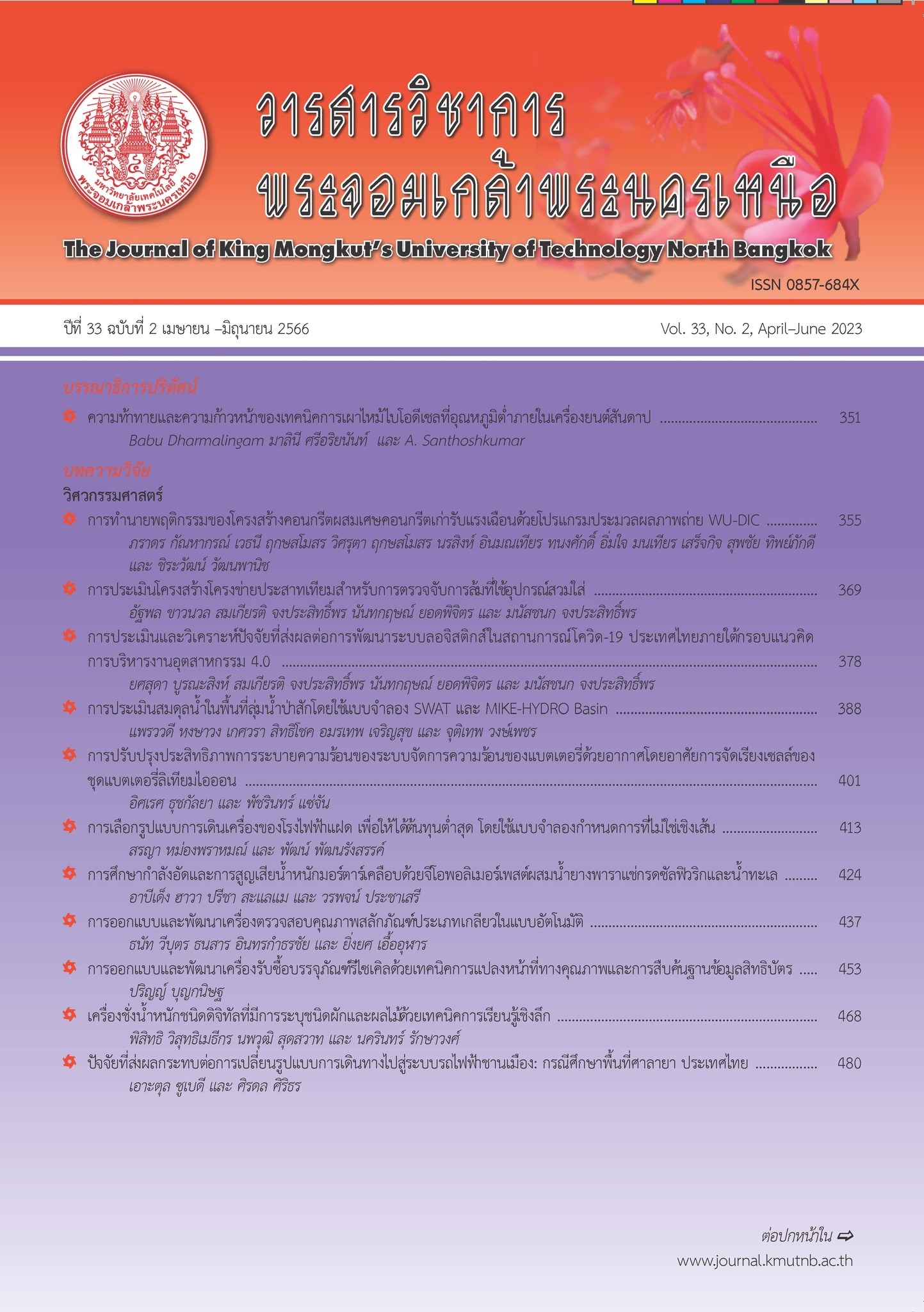การประเมินและวิเคราะห์ปัจจัยที่ส่งผลต่อการพัฒนาระบบโลจิสติกส์ในสถานการณ์โควิด-19 ประเทศไทยภายใต้กรอบแนวคิดการบริหารงานอุตสาหกรรม 4.0
Main Article Content
บทคัดย่อ
โควิด-19 เป็นโรคระบาดที่มีการแพร่กระจายตัวอย่างรวดเร็วส่งผลให้ผู้ประกอบการหลายรายต้องปิดกิจการลง ในทางตรงกันข้ามธุรกิจโลจิสติกส์และพาณิชย์อิเล็กทรอนิกส์กลับเติบโตอย่างรวดเร็ว เนื่องจากประชาชนกักตัวและทำงานอยู่ในที่พักอาศัย ด้วยพฤติกรรรมของผู้บริโภคที่เปลี่ยนไปเช่นนี้จึงมีผลต่อระบบโลจิสติกส์เป็นอย่างมาก การวิจัยนี้มีวัตถุประสงค์ เพื่อประเมินปัจจัยที่ส่งผลกระทบต่อระบบโลจิสติกส์และพัฒนาระบบงานในสถานการณ์โควิด-19 วิธีการศึกษาประกอบด้วย การศึกษาอุตสาหกรรม 4.0 การศึกษาและประเมินปัจจัยที่ส่งผลกระทบต่อระบบโลจิสติกส์ในสถานการณ์โควิด-19 การศึกษาความเป็นไปได้ในการประยุกต์ใช้อุตสาหกรรม 4.0 โดยแบบสอบถามปลายปิด การสัมภาษณ์แบบกึ่งโครงสร้าง และการสนทนากลุ่ม กับผู้บริหารระดับกลางและระดับสูง 15 ท่านของบริษัทผู้ให้บริการโลจิสติกส์ขนาดใหญ่ และพัฒนาระบบงานโดยการแนะนำเทคโนโลยีที่เหมาะสมกับระบบงานของผู้ให้บริการด้านโลจิสติกส์ ผลการศึกษาพบว่าปัจจัยที่ส่งผลกระทบต่อระบบ โลจิสติกส์ในสถานการณ์โควิด-19 ได้แก่ ความสามารถในการปรับตัวอย่างยั่งยืน ความยืดหยุ่นของห่วงโซ่อุปทาน ความไว้วางใจ การสื่อสาร และพฤติกรรมผู้บริโภค ยิ่งไปกว่านี้อุตสาหกรรม 4.0 สามารถเพิ่มประสิทธิภาพการทำงาน ลดผลกระทบของปัจจัยต่อระบบโลจิสติกส์ และช่วยในการเพิ่มขีดความสามารถในการแข่งขันด้านโลจิสติกส์ในอนาคต
Article Details

อนุญาตภายใต้เงื่อนไข Creative Commons Attribution-NonCommercial-NoDerivatives 4.0 International License.
บทความที่ลงตีพิมพ์เป็นข้อคิดเห็นของผู้เขียนเท่านั้น
ผู้เขียนจะต้องเป็นผู้รับผิดชอบต่อผลทางกฎหมายใดๆ ที่อาจเกิดขึ้นจากบทความนั้น
เอกสารอ้างอิง
World Health Organization. (2020, Dec). Coronavirus disease (COVID-19) advice for the public. Geneva, Switzerland. [Online]. Available: https://www.who.int/emergencies/diseases/ novel-coronavirus-2019/advice-for-public
Department of Disease Control. (2020, Dec). Corona Virus Disease (COVID-19). Nonthaburi, Thailand. [Online]. Available: https://ddc. moph.go.th/viralpneumonia/eng/index.php
T. K. Dasaklis, C. P. Pappis, and N. P. Rachaniotis, “Epidemics control and logistics operations: A review,” International Journal of Production Economics, vol. 139, no. 2, pp. 393–410, 2012.
L. Zhang, J. Tian, R. Y. Fung, and C. Dang, “Materials procurement and reserves policies for humanitarian logistics with recycling and replenishment mechanisms,” Computers & Industrial Engineering, vol. 127, pp. 709–721, 2019.
K. H. Goldschmidt and S. Kumar, “Humanitarian operations and crisis/disaster management: A retrospective review of the literature and framework for development,” International Journal of Disaster Risk Reduction, vol. 20, pp. 1–13, 2016.
S. A. Torabi, I. Shokr, S. Tofighi, and J. Heydari, “Integrated relief pre-positioning and procurement planning in humanitarian supply chains,” Transportation Research Part E: Logistics and Transportation Review, vol. 13, pp. 123–146, 2018.
A. Kumar, S. Luthra, K. Mangla, and Y. Kazançoğlu, “COVID-19 impact on sustainable production and operations management,” Sustainable Operations and Computers, vol. 1, pp. 1–7, 2020.
V. Alcácer and V. Cruz-Machado, “Scanning the industry 4.0: A literature review on technologies for manufacturing systems,” Engineering Science and Technology, an International Journal, vol. 22 no. 3, pp. 899–919, 2019.
P. Wisidwinyoo, S. Thapjit, and S. Wisuttipaet, “The factors affecting innovation management in food industrial case study: Cpram company limited,” The Journal of KMUTNB, vol. 30, no. 2, pp. 343–350, 2019 (in Thai).
C. Maksuk, S. Thepchit, and S. Srikijsuwan, “Business development model for metal parts manufacturing for the aerospace industry,” The Journal of KMUTNB, vol. 30, no. 1, pp. 170–181, 2019 (in Thai).
P. Somparn, “Measure of dispersion in biological research: Standard,” Thai Science and Technology Journal, vol. 26, no. 3, pp. 490–498, 2018 (in Thai).
N. Neawchumpa, C. Ponathong, and J. Skulkhu, “A factor analysis of scientific attitude of science students of public,” Veridian E-Journal, Silpakorn University, vol. 9, no. 3, pp. 1676–1691, 2016 (in Thai).
B. Texsanguan, T. Boonyasopon, W. Ketsingha, and N. Surapongrakjaron, “The development model of learning organization and knowledge management by knowledge sharing via internet network,” The Journal of KMUTNB, vol. 24, no. 1, pp. 198–211, 2014 (in Thai).
G. Büchi, M. Cugno, and R. Castagnoli, “Smart factory performance and Industry 4.0,” Technological Forecasting and Social Change, vol. 150, pp. 119790–119800, 2020.
E. Hofmann and M. Rusch, “Industry 4.0 and the current status as well as future prospects on logistics,” Computers in industry, no. 89, pp. 23-34, Aug. 2017.
M. Jongprasithporn, N. Yodpijit, C. Phaisanthanaphark, Y. Buranasing, and T. Sittiwanchai, “Effects of industry 4.0 on human factors/ergonomics design in 21st century,” in Advances in Intelligent Systems and Computing, 2020, vol. 1202 AISC, pp. 437–443.
M. S. Kuma, R. D. Raut, V. S. Narwane, and B. E. Narkhede, “Applications of industry 4.0 to overcome the COVID-19 operational challenges,” Diabetes & Metabolic Syndrome: Clinical Research & Reviews, vol. 14, no.5, pp. 1283–1289, 2020.
K. Fukuda, “Science, technology and innovation ecosystem transformation toward society 5.0,” International Journal of Production Economics, vol. 220, pp. 107460–107474, 2019.
T. P. Vu, D. B. Grant, and D. A. Menachof, “Exploring logistics service quality in Hai Phong, Vietnam,” The Asian Journal of Shipping and Logistics, vol. 2, no. 36, pp. 54–64, 2020.
B. A. Kadir and O. Broberg, “Human well-being and system performance in the transition to industry 4.0,” International Journal of Industrial Ergonomics, vol. 76, pp. 102936–102949, 2020.

